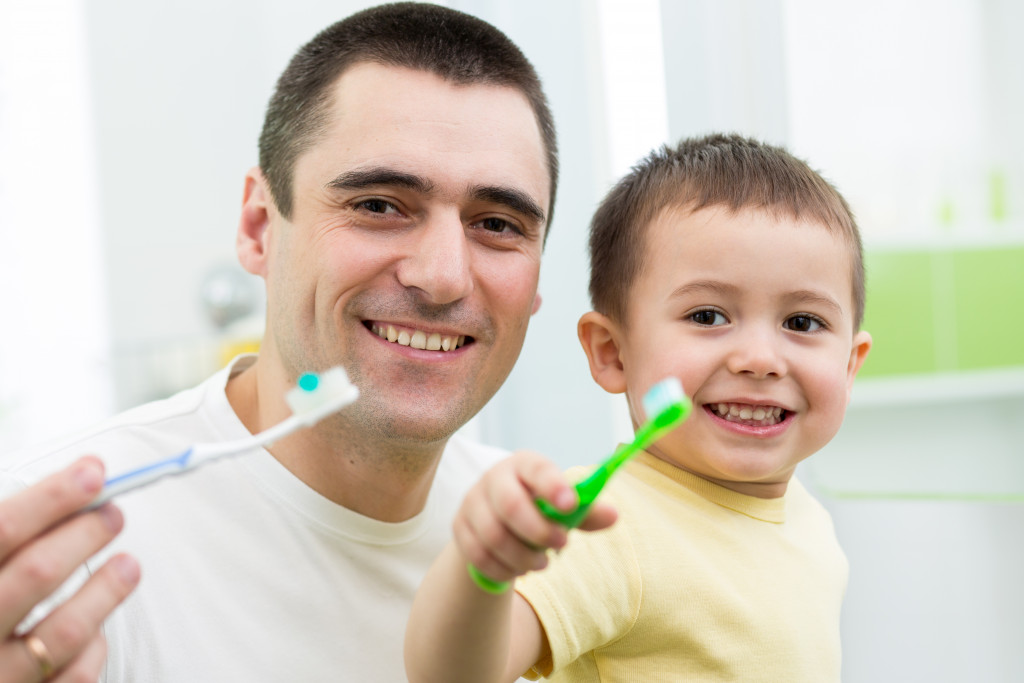- Schedule regular dental checkups to monitor your children’s oral health and catch any issues early.
- Guide them on the basics of brushing, flossing, and drinking water after treats.
- Let children choose their toothbrush and toothpaste for personalization and comfort to make them more eager to brush.
- Make brushing fun with age-appropriate songs or videos for better engagement and retention.
Teaching children the importance of oral health is a critical part of parenting. Poor oral hygiene can lead to cavities, gum disease, and other serious dental problems that affect our overall health. That’s why teaching kids how to take care of their teeth from an early age is so important.
With proper guidance, your children can develop healthy habits that will serve them well into adulthood. This guide will provide tips on educating your children about the importance of good oral hygiene and help them develop lifelong habits that ensure they maintain excellent oral health.
Regularly schedule dental checkups.

Teaching children about oral health is essential and regular dental checkups are a good way to start. Having your child visit a reputable dental office twice a year allows the dentist to monitor the development of their mouth and teeth, catch any oral disease early and give necessary treatment or guidance on brushing.
It also promotes good habits in your children that will last throughout their lives! Even if your kids’ teeth look perfectly healthy, regular checkups could lead to finding signs of trouble before it becomes more serious and costlier to treat. Thus, scheduling regular visits with an experienced dentist should be non-negotiable when upholding your child’s dental health.
Guide them about basic oral hygiene.
Guiding your children with the basics of oral hygiene is the first step to instilling a lifelong habit of good oral health. Here are a few simple steps you can take to get your children off to the right start:
Show them the right way to brush and floss.
Brushing and flossing correctly is key to preserving optimal oral health. Research has demonstrated that these daily habits can help ward off cavities and safeguard against gum disease among other serious problems.
Show them the right way to brush and floss twice daily; it takes at least two minutes each time, ensuring their teeth and gums are clean. Show them how to be mindful with their technique, so they can reach those hard-to-reach places in between teeth.
Additionally, they should drink water after eating sugary treats to minimize the damage done by the acid created by bacteria during digestion. By establishing healthy habits now, they’ll be well on their way to having strong teeth and gums throughout their life!
Let children choose their toothbrushes and toothpaste.

Allowing children to take part in the decisions regarding their oral health is an effective way of fostering lifelong dental hygiene habits. Priority should be given to choosing a soft-bristled toothbrush that fits both comfort and size, as smaller brushes can easily clean between teeth, while larger toothbrushes help children brush their molars.
Additionally, providing children with toothpaste choices allows them to select whichever flavor suits them best. Doing so may make brushing more enjoyable for the child and motivate them to develop better oral healthcare habits.
Make brushing fun with age-appropriate songs or videos.
Teaching children proper oral hygiene is essential to their physical and mental growth. Making brushing fun with age-appropriate songs or videos is an effective way to help them connect with their daily routine.
This type of engagement not only helps kids learn important tips for taking care of their teeth but also teaches them how beneficial it can be to have good oral health habits. Incorporating music into brushing routines can help kids stay interested in their dental care and make it more enjoyable. Furthermore, finding the right materials to teach your children about oral health may even lead to making healthier food and lifestyle choices as they get older.
Teach kids how to use mouthwash correctly.
Teaching children how to use mouthwash correctly is important in helping them take ownership of their oral health. This starts by providing them with appropriate amounts and types of mouthwash depending on their age or medical requirements.
Once that is established, parents need to guide their child about the importance of using it daily such as its ability to remove plaque, bacteria, and food particles from the mouth that brushing can’t always reach. Parents should also demonstrate how to swish the rinse in their mouths and any other expectations regarding use like spitting it out into a sink or cup.
Encourage drinking water frequently.
Encouraging children to drink water more frequently is important in promoting optimal oral health. Not only should find ways to drink more water become natural practice, but understanding how it helps create healthy teeth and gums can motivate others to do so.
Water serves as a natural cleansing agent, washing away food particles and reducing plaque build-up, but it also provides essential minerals that support strong tooth enamel. Additionally, balanced saliva levels produced by drinking water can help fight off bacteria that lead to cavities.
These are just a few of the simple steps you can take to help instill healthy oral hygiene habits in your children. Nurturing healthy oral habits in children begins with parents, as they are the ones who must demonstrate and enforce these critical practices.
